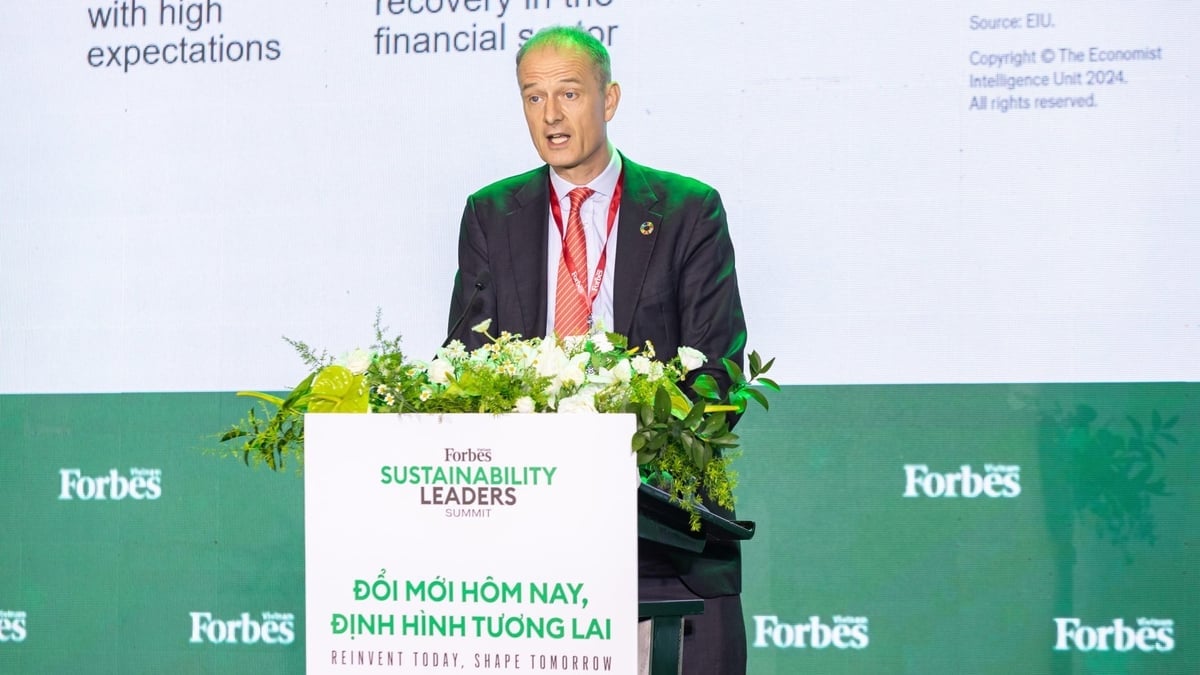May 19, 2025 | 15:48 GMT +7
May 19, 2025 | 15:48 GMT +7
Hotline: 0913.378.918
May 19, 2025 | 15:48 GMT +7
Hotline: 0913.378.918
During the Sustainability Leaders Summit 2025 organized by Forbes Vietnam on April 10, Patrick Haverman, UNDP Deputy Resident Representative in Vietnam, affirmed that the country is demonstrating commendable efforts in shaping its future through long-term policies and decisive actions.
According to Haverman, Vietnam is among the countries that suffer the most substantial impact from climate change, with annual losses exceeding 1 billion USD. Notably, this figure can potentially rise to 523 billion USD by 2050 without drastic solutions.

Patrick Haverman, Deputy Resident Representative of UNDP Vietnam, delivering a speech at the conference. Photo: Organizing Committee.
“Green growth is essential for accessing new markets. We cannot sacrifice the environment for short-term gains while overlooking long-term benefits. We must protect our planet for future generations. The Agenda for Sustainable Development will support more comprehensive growth. As a result, we must take both people and the planet into account when promoting economic growth and development,” Patrick Haverman added.
Haverman noted that the rapid changes in the global landscape are forcing stakeholders to quickly enhance their adaptability. Similar to other countries, Vietnam is facing a range of global challenges such as conflicts, climate change, disruptive technologies, and inequality. However, according to Haverman, while climate change increases risks, it serves as a powerful motivator for innovation, creativity, investment, and sustainable transformation.
From the perspective of a manufacturing business, Bui Khanh Nguyen, Vice President of Public Affairs, Communications, and Sustainability at Coca-Cola Vietnam, noted that the concepts of “collection” and “recycling” have extended beyond routine production to become a core part of the company’s long-term development strategy. “We see the changes as an opportunity for innovation and for developing a sustainable supply chain. This major shift will allow manufacturers to become an indispensable part of the circular economy, contributing to resource optimization and environmental protection,” Vice President Nguyen stressed.

Bui Khanh Nguyen, Vice President of Public Affairs, Communications, and Sustainability at Coca-Cola Vietnam, sharing on the company’s green transition journey. Photo: Organizing Committee.
According to Vice President Nguyen, modern-day consumers, especially the younger generation, are gravitating toward the support of sustainable products. Businesses that make methodical and comprehensive investments in sustainability will gain an advantage in attracting customers. The implementation of the Extended Producer Responsibility (EPR) presents an opportunity for companies to reevaluate their production chain systematically. “We must consider lighter and more environmentally friendly packaging. Even the color and materials of packaging must be carefully selected from the design stage to facilitate collection and recycling. This is a critical transition that requires investment from the very first stage,” he added.
However, green transition is a considerable challenge for the majority of local businesses. Sustainable products typically require higher production costs, while their appearance may not necessarily appeal to the market. As a result, companies must remain patient and proactively engage in communication efforts to generate a change in consumer perceptions, especially as younger consumers show a growing preference for eco-friendly products.
A key factor in realizing the green transition is securing access to appropriate financing. According to Jason Yang, Senior Director of Sustainability and Transition at UOB Vietnam, effective financing requires that banks possess a clear understanding of business activities and the environmental impact of their initiatives. This knowledge allows banks to assess and monitor loans scientifically.

Speakers at the conference discussing policies to promote the green transition. Photo: Organizing Committee.
UOB is currently applying six sustainable finance frameworks, with the circular economy framework standing as the most suitable option for Vietnam. Accordingly, businesses can access green financing if they incorporate recycled materials into their product designs, reuse at least 50% of their waste, or meet global recycling standards. For companies currently undergoing the transition process, the bank offers a “transition” portfolio through 2030 to help them gradually access capital.
However, Senior Director Jason Yang also warned that if consumers are hesitant to pay a premium for sustainable products, green investment will struggle to gain momentum. On the other hand, policies must provide strong incentives to encourage businesses to adopt the green transition without bearing excessive risk.
According to Pham Hong Diep, Chairman of Shinec Joint Stock Company, Vietnam is gradually improving its legal framework to effectively implement the circular economy model, with EPR being a key tool to promote the green transition. Several major corporations have proactively disclosed their packaging recycling rates, highlighting the role of product design and innovation in meeting environmental standards. Consequently, EPR is expected to become a significant driving force behind the sustainable development of the economy.
According to Chairman Diep, current regulations dictate that eco-industrial parks must establish circular value chains and symbiotic models among the business community. However, these degree and circular-level requirements lack the impact necessary to encourage uniform transformation across the entire system. As a result, Vietnam must promptly enact a dedicated law on the circular economy, which will enable businesses to effectively implement EPR and access green financing.
Translated by Nguyen Hai Long

(VAN) 14 out of 35 domesticated elephants in Dak Lak province have had their living conditions improved, with 11 of them currently participating in the non-riding elephant tourism model.

(VAN) Muong Nhe Nature Reserve hopes that being upgraded to a national park will lay the foundation for forest protection efforts to be carried out in a systematic, modern, and sustainable manner.
/2025/05/16/3923-2-171845_52.jpg)
(VAN) Lower costs, higher yields, and improved soil quality are outstanding benefits that soybeans bring when integrated into the crop rotation system.

(VAN) The 'For a Green National Environment' programme aims to promote a green lifestyle, support businesses in implementing ESG practices, and turn Net Zero commitments into concrete actions.

(VAN) Cold-barn systems efficiently manage environmental and temperature conditions, which aids in the prevention of respiratory diseases in pigs and protects them from the vectors that transmit African swine fevers.

(VAN) To tackle challenges, the project 'Addressing key technical bottlenecks in the grouper supply chain in Vietnam' has been underway since 2024.

(VAN) The project 'Disease-Resilient and Sustainable Cassava Production Systems in the Mekong Region', funded by the Australian Center for International Agricultural Research (ACIAR), is being implemented from 2024 to 2028.